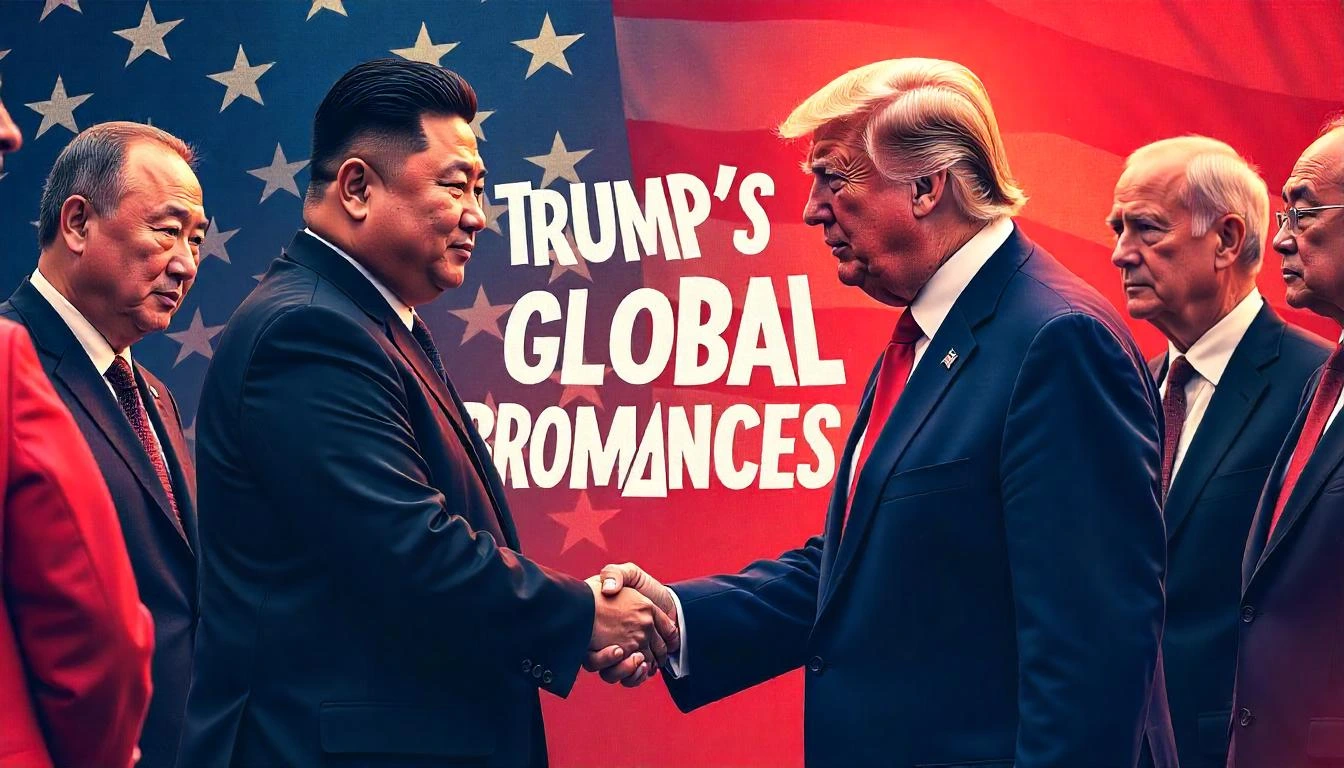Donald Trump’s international relationships have always been a spectacle. Whether it was his unconventional diplomacy with foreign leaders or his candid remarks about global alliances, Trump’s foreign policy often defied traditional norms. As he approaches a potential second term, world leaders may be eagerly anticipating his return, expecting him to once again shift U.S. foreign policy away from long-standing global alliances and toward populist, sometimes authoritarian, interests.
Trump’s Unique Approach to Global Leadership
In 2016, when he was campaigning for the presidency, Trump caused quite a stir when he remarked on his relationship with North Korean leader Kim Jong Un: “It’s nice to get along with someone who has a lot of nuclear weapons.” Trump wasn’t just talking about the power balance; he was describing a unique form of diplomacy where flattery and personal chemistry seemed to take center stage. His controversial yet surprising bromance with Kim — a leader notorious for his isolationist and authoritarian rule — became a defining moment of his first term.
“He’d like to see me back, too,” Trump once said of Kim. “I think he misses me, if you want to know the truth.” These remarks sparked a mixture of intrigue and skepticism. While Trump’s political style has always leaned toward transactional relationships, this candid and personal approach to foreign diplomacy left the world watching with mixed reactions.
The “Bro Vote” and Trump’s Global Fanbase
Trump’s appeal is not limited to young American males, often referred to as the “bro vote.” His brand of populism and unorthodox style has resonated with older leaders overseas as well. These leaders, many of whom share populist or even authoritarian leanings, look to Trump to reshape U.S. foreign policy in ways that align with their own political priorities.
Political analysts suggest that Trump’s second term may focus on reorienting American foreign policy towards these like-minded leaders. His relationships with world leaders who share a common skepticism of globalism could become even more prominent. Experts believe this could lead to more “transactional” diplomacy, where alliances are based on pragmatic, often short-term goals rather than long-term commitments.
Trump’s Diplomatic Style: Personal Chemistry Over Protocol
One of Trump’s most noticeable tactics during his first term was his ability to form personal bonds with foreign leaders. His interactions with autocrats and dictators, in particular, were often characterized by flattery and a disregard for traditional diplomatic norms. Critics argue that this came at the expense of promoting democratic values and human rights, as Trump showed a penchant for praising leaders like Kim Jong Un, Russian President Vladimir Putin, and Turkish President Recep Tayyip Erdogan.
Trump’s fondness for authoritarian figures has sparked debates about the moral implications of such relationships. Despite criticisms, it cannot be denied that Trump’s personal diplomacy was effective in some respects, especially in matters of geopolitical strategy. His ability to directly communicate with leaders of adversarial nations often sidestepped the usual channels of diplomacy, offering a more unpredictable but sometimes effective approach to international relations.
What to Expect from Trump 2.0?
Looking ahead, experts believe Trump’s foreign policy during a potential second term will be shaped by a blend of pragmatism and personal diplomacy. His relationships with world leaders like Kim Jong Un and Putin may intensify, as both sides seek to navigate complex global challenges, including the war in Ukraine and tensions in the Middle East.
“Transactional” is the key word. According to Charles Kupchan, a professor of international affairs at Georgetown University, Trump will likely focus on ending long-standing conflicts through direct conversations with both democratic and non-democratic leaders. This approach could lead to agreements that may surprise even his closest allies.
Trump’s second term could also lead to new alliances, where the United States distances itself from traditional global coalitions in favor of more flexible, individual partnerships with nations that align with his populist agenda.
Frequently Asked Questions (FAQs)
1. What does Trump’s “transactional” diplomacy mean?
Trump’s “transactional” approach to foreign policy means that relationships with other countries are built on practical, often short-term, deals rather than long-term commitments or ideological alignments. This style prioritizes immediate benefits for the U.S. over traditional diplomatic values.
2. How did Trump’s relationship with Kim Jong Un impact U.S.-North Korea relations?
Trump’s personal chemistry with Kim Jong Un was a defining feature of his first term. While it did not lead to substantial policy changes or denuclearization, it initiated direct communication between the two leaders and resulted in a series of high-profile summits. The relationship also helped shift U.S. foreign policy in ways that avoided direct confrontation.
3. Will Trump continue to praise authoritarian leaders in a second term?
It is likely, given Trump’s preference for engaging with authoritarian leaders who align with his views on nationalism and global governance. His admiration for figures like Kim Jong Un, Vladimir Putin, and others might continue as part of his broader strategy of reducing U.S. involvement in global alliances and focusing on bilateral relationships.
4. What can we expect from Trump’s foreign policy in the Middle East and Ukraine?
Trump’s second term is expected to focus on negotiating peace deals in conflict zones like the Middle East and Ukraine. His approach is likely to involve direct talks with both democratic and authoritarian leaders, with the goal of ending conflicts that have persisted under previous administrations.
5. How does Trump’s diplomatic style differ from traditional U.S. foreign policy?
Trump’s style is characterized by his focus on personal relationships with foreign leaders, often over traditional diplomatic channels. This contrasts with past U.S. administrations, which have emphasized multilateral agreements, human rights, and international cooperation as cornerstones of foreign policy.
